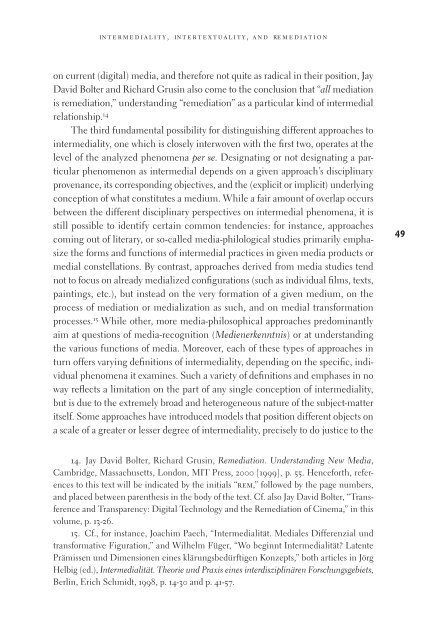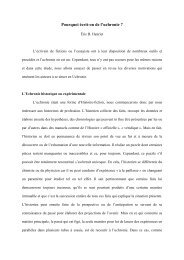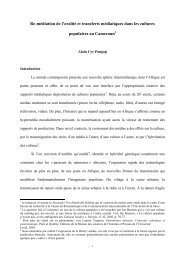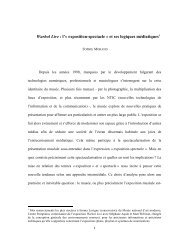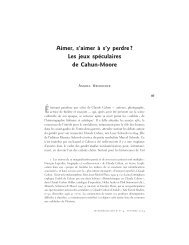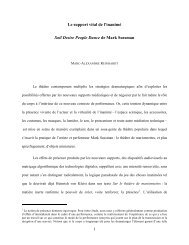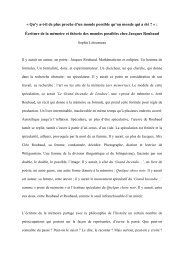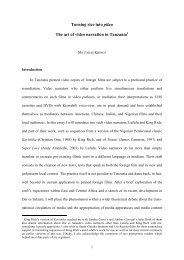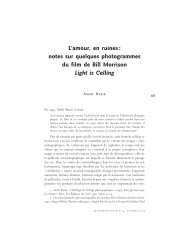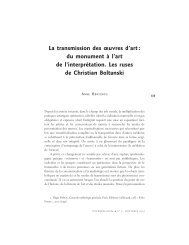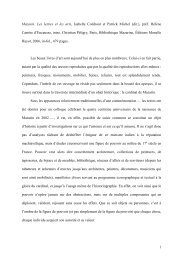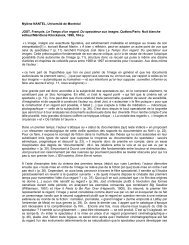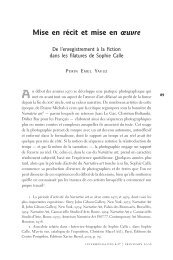Intermediality - Centre de recherche sur l'intermédialité (CRI ...
Intermediality - Centre de recherche sur l'intermédialité (CRI ...
Intermediality - Centre de recherche sur l'intermédialité (CRI ...
Create successful ePaper yourself
Turn your PDF publications into a flip-book with our unique Google optimized e-Paper software.
intermediality, intertextuality, and remediation<br />
on current (digital) media, and therefore not quite as radical in their position, Jay<br />
David Bolter and Richard Grusin also come to the conclusion that “all mediation<br />
is remediation,” un<strong>de</strong>rstanding “remediation” as a particular kind of intermedial<br />
relationship. 14<br />
The third fundamental possibility for distinguishing different approaches to<br />
intermediality, one which is closely interwoven with the fi rst two, operates at the<br />
level of the analyzed phenomena per se. Designating or not <strong>de</strong>signating a particular<br />
phenomenon as intermedial <strong>de</strong>pends on a given approach’s disciplinary<br />
provenance, its corresponding objectives, and the (explicit or implicit) un<strong>de</strong>rlying<br />
conception of what constitutes a medium. While a fair amount of overlap occurs<br />
between the different disciplinary perspectives on intermedial phenomena, it is<br />
still possible to i<strong>de</strong>ntify certain common ten<strong>de</strong>ncies: for instance, approaches<br />
coming out of literary, or so-called media-philological studies primarily emphasize<br />
the forms and functions of intermedial practices in given media products or<br />
medial constellations. By contrast, approaches <strong>de</strong>rived from media studies tend<br />
not to focus on already medialized confi gurations (such as individual fi lms, texts,<br />
paintings, etc.), but instead on the very formation of a given medium, on the<br />
process of mediation or medialization as such, and on medial transformation<br />
processes. 15 While other, more media-philosophical approaches predominantly<br />
aim at questions of media-recognition (Medienerkenntnis) or at un<strong>de</strong>rstanding<br />
the various functions of media. Moreover, each of these types of approaches in<br />
turn offers varying <strong>de</strong>fi nitions of intermediality, <strong>de</strong>pending on the specifi c, individual<br />
phenomena it examines. Such a variety of <strong>de</strong>fi nitions and emphases in no<br />
way refl ects a limitation on the part of any single conception of intermediality,<br />
but is due to the extremely broad and heterogeneous nature of the subject-matter<br />
itself. Some approaches have introduced mo<strong>de</strong>ls that position different objects on<br />
a scale of a greater or lesser <strong>de</strong>gree of intermediality, precisely to do justice to the<br />
14. Jay David Bolter, Richard Grusin, Remediation. Un<strong>de</strong>rstanding New Media,<br />
Cambridge, Massachusetts, London, MIT Press, 2000 [1999], p. 55. Henceforth, references<br />
to this text will be indicated by the initials “rem,” followed by the page numbers,<br />
and placed between parenthesis in the body of the text. Cf. also Jay David Bolter, “Transference<br />
and Transparency: Digital Technology and the Remediation of Cinema,” in this<br />
volume, p. 13-26.<br />
15. Cf., for instance, Joachim Paech, “Intermedialität. Mediales Differenzial und<br />
transformative Figuration,” and Wilhelm Füger, “Wo beginnt Intermedialität? Latente<br />
Prämissen und Dimensionen eines klärungsbedürftigen Konzepts,” both articles in Jörg<br />
Helbig (ed.), Intermedialität. Theorie und Praxis eines interdisziplinären Forschungsgebiets,<br />
Berlin, Erich Schmidt, 1998, p. 14-30 and p. 41-57.<br />
49


